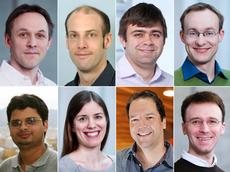Distinguished talents
The European Research Council (ERC) is awarding ERC Starting Grants for the fifth time and supporting ETH projects with funding of about CHF 14 million. Eight professors, one woman and seven men, are being honoured this year – the highest number ever at ETH Zurich.

Roland Siegwart, ETH Vice-President for Research and Economic Relations, has every reason to be happy: eight ETH Zurich professors have been awarded the coveted ERC Starting Grants this year for their projects – more than ever before. “It is incredible how productive our young researchers are. This gives us the confidence that we brought the right talents to ETH.” Four of those honoured have been professors at ETH only since 2011 and are already bringing the first research money to Zurich. Each of the submitted projects will be supported by the European Research Council with funding of up to CHF1.8 million. The Starting Grants are reserved for promising young research talents, so it is no surprise that the seven men and one woman are only between 30 and 38 years old.
Better images for better medicine
Christian Degen comes from Zurich and has been a professor at the Laboratory for Solid-State Physics since 2011. He has a vision: he wants to combine magnetic resonance with atomic force microscopy in such a way that the advantages of both processes are fully exploited. His goal is to obtain three-dimensional images of, for example, individual viruses or large protein molecules in very high resolution. Another young researcher who wants to improve an imaging technique is Marco Stampanoni, professor at the Institute for Biomedical Engineering. He has been working for 10 years on improving X-ray technology both at ETH and PSI. In Stampanoni’s project, refraction and scattering from X-rays are used productively, to increase the contrast of the X-ray images.
Strong computer science
Two of this year’s ERC Starting Grants go to researchers at the Department of Computer Science. Professor Andreas Krause is applying himself to the question of how decision-relevant information from sensor and information networks can be extracted automatically and used responsibly. In his project, he is developing new methods that can be applied and examined, for example, in social media and the environmental sciences. In her project “Intelligent Shape Modeling”, 31-year-old computer science professor Olga Sorkine is developing tools for 3D modelling that even non-professionals can use to create 3D graphics quickly and easily.
Nano-crystals and applied mathematics
The youngest ERC recipient, Maksym Kovalenko, is professor at the Laboratory for Inorganic Chemistry and researches nano-crystals. These crystals have unique properties, but in order to make use of these for new technologies nano-crystals must be integrated successfully into other nano-crystalline solids. In his project, Kovalenko aims, inter alia, to better understand and control the surface chemistry of nano-crystals. Originally from India, Siddhartha Mishra is researching at the Seminar for Applied Mathematics. The design of efficient and sturdy algorithms has become increasingly important in recent years. Mishra now wants to develop algorithms that can help to simulate large and complex systems. In the future, these could facilitate the planning, forecasting and risk assessment of interesting physical and technological problems.
New synthesis and fast movements
American Jeffrey W. Bode, professor at the Laboratory for Organic Chemistry, has dedicated himself to amino acids and amines, the basis of many pharmaceutical substances. Since the synthesis of such substances is still expensive and produces a lot of chemical waste, the goal of his ECR project is to develop new catalysts for the production of valuable amines and amino acid chains (peptides). Hans Jakob Wörner observes the movements of electrons in molecules. Not an easy task, since these move in the range of attoseconds (1 as = 10-18 s). The 31-year-old professor at the Laboratory for Physical Chemistry has an ambitious goal with his ERC project: to measure the electron dynamics in molecules using new, experimental processes.
ERC Starting Grant
The European Research Council (ERC) is awarding the Starting Independent Researcher Grants for the fifth time. These grants are funding instruments to support projects of promising scientific talents, enabling them to set up their own research group. The only selection criterion for the award is the scientific excellence of the researchers and the submitted projects. ERC Starting Grant projects are supported with funding of up to CHF 1.8 million over a period of five years.







READER COMMENTS